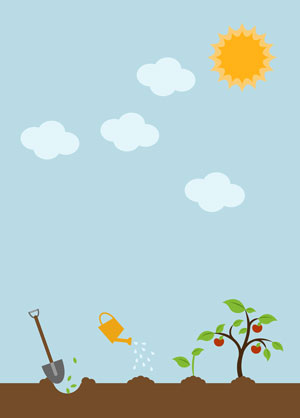What do we actually mean by “sowing seeds”?
Sarah Fegredo explores an expression much used by Christians
 As Christians we want to be “The One” …the one to whom a person turns and says “What you said makes sense and I want to give my life to Jesus.” But the reality is it doesn’t often happen, and in our disappointment we console ourselves with the thought that we were sowing seeds.
As Christians we want to be “The One” …the one to whom a person turns and says “What you said makes sense and I want to give my life to Jesus.” But the reality is it doesn’t often happen, and in our disappointment we console ourselves with the thought that we were sowing seeds.
I found myself doing this in my work with a young woman called Hayley. I first met Hayley when I was her youth worker. She came along to the group because a friend invited her and she stayed for a number of years. I became close to her through various ups and downs and we’ve now become adult friends.
At some point in her post-school journey, through university, volunteering at a Summer Camp in the US, helping with holiday clubs, and other Christian activities, she became a Christian. She’s now a fully paid-up, Jesus loving, church going, house group attending, Christian disciple.
My question is “Who led her to the Lord?” It wasn’t me. So was it the people she worked with in the US? The peers who were Christians, the Soul Survivor visits? The on-going friendship with me and other adults in my church?
Hayley tells me that she realised one day that she was praying to a God she thought she didn’t believe in and then realised that meant that she must do, so she’d better sort things out with him. Arguably no one led her to the Lord!
As I potter in my garden I’m inspired at how often Jesus talks about growing things. Pondering the questions that evangelism raises, it occurs to me that there are answers to be found amongst the soil and greenery. When I garden, I don’t just plant seeds, before that I have to prepare the ground.This involves choosing the right ground for the right plant; it’s no good putting a heather in alkaline soil; it will die.
Having chosen the right plant, I loosen the earth, add fertilizer, get rid of stones and rake it level. Then I plant the seed, at the right depth. I might put some netting over the bed to keep the birds off.
And then I wait…and watch. Part of gardening is keeping an eye out for what needs doing for particular plants; weeds might appear, water might be needed, some shelter on a frosty night. It’s straight out of a parable! Later on in the plant’s life it might need tying in to some support, or training to grow in a certain shape; it might need pruning or feeding. In a big garden there would be a whole team of gardeners to do these jobs.
After a while, the everyday miracle occurs, and the plant flowers or fruits. But who made it do that? Was it me, the one who sowed the seed? The gardeners after me, who fed or pruned, who trained or sprayed for pests?
You could say that none of us made the fruit happen; the plant just did it all by itself. True, but it wouldn’t have done it so well, in that place if the team of gardeners hadn’t all done their bit. Hayley’s story tells me that all those who “gardened” her played a part, but that ultimately the flower that she has blossomed into is because of God’s work in her life (See 1 Cor. 3:5-9). I have been delighted to see the flowers even though I didn’t do all the work, and occasionally I’ve sat in the sunshine with her, or pulled her into the greenhouse for some TLC when she’s needed it.
So what are you doing in your part of the garden? Are you seed sowing? Watering? Adding some well-rotted compost, or tying a plant to some support? Maybe you have had the joy of a plant blossoming right before your eyes.
Maybe you haven’t and you wonder whether you’re doing any evangelism at all. Maybe you’re having to do the hard work of digging the plot over to clear it. If your garden is looking a bit thin, maybe you’re putting the wrong plants in the wrong places and they can’t thrive? Are you planting at the right depth? Some seeds take a long time to germinate; are you getting impatient and digging them up to have a look?
Whatever you are doing at the moment, as an individual and in your church, if you are playing your part, in the passage mentioned above, Paul assures us we are promised a reward. If you aren’t doing any gardening, get your wellies on and get out here, there’s plenty to be done. It’s winter as I write this and gardens look empty and dead, but we gardeners know, if we wait patiently and tend carefully, that in July we’ll have more courgettes than we know what to do with.
Picture: freepik.com
Sarah Fegredo is an Accredited Youth Specialist living in Nottingham
Baptists Together, 11/04/2016